Ever heard the saying “Jack of all trades, master of none?” While a general store can cater to a broad range of customers, niche businesses deliver best-in-class service to a specific target audience.
Tapping into a niche market offers many benefits. Niche businesses have a deep understanding of their customers’ needs and can establish themselves as the go-to brand for anyone interested in their areas of expertise.
Choosing a niche can also streamline your business. From your unique value proposition to product line extensions, focusing on a niche market simplifies decision making, giving you a clear idea of who your customers are and what they’re looking for.
If you’re struggling to land on a product idea for your business, identifying a niche is a great starting point. This post explains what a niche market is, gives nine niche market examples, and outlines how to find relevant in-demand products.
What is a niche market?
A niche market is a distinct segment of a wider market, defined by its unique needs or characteristics.
For example, within the women’s shoes market there are niches for eco-friendly shoes, orthopedic shoes, or hiking boots. Each of these niches caters to a unique set of requirements that don’t apply to the general market.
Almost every market contains niches. Identifying them requires a detailed understanding of consumer needs. Common ways to define a niche include looking at factors such as:
- Price (luxury, moderate, discount)
- Demographic (gender, age, income level, education level)
- Product quality (premium, handmade, economical)
- Psychographics (values, interests, attitudes)
- Geography (country, city, neighborhood)
Choosing to focus on a niche is a strategic business decision to serve a specific customer base more effectively than competitors who target the broader market. Businesses who are competing within a niche may decide to niche down even further as a way to differentiate their brand.
Take men’s athletic wear, for example. Within this market, there’s a niche for running gear. Businesses who sell running products could focus on a subset of that niche, such as running gear for marathon runners. This allows them to serve customers looking for a specialized type of running gear that may not be offered by other running gear stores.
9 niche market examples
It’s possible to build a business focused on trending products. However, a solid alternative route to ecommerce success is selecting a niche market and drilling down to find niche products with a good market fit.
Here are nine markets with enough niche opportunities to support plenty of new businesses:
- Conscious consumers
- Health and wellness
- Pet owners
- Outdoor enthusiasts
- Travelers
- Gamers
- Homeowners and renters
- Remote workers
- Locals
1. Conscious consumers
Sustainability continues to be a significant concern for consumers. Every year, surveys show that most of us are willing to change our shopping habits to reduce our environmental impact. For some, that means investing in high-quality products that will last longer. For others, it’s about adjusting habits to buy more second-hand and resale items.
Another type of sustainable product is vegan, eco-friendly, or cruelty-free variations of conventional items. If there’s a product that’s regularly purchased by the mass market, there may be a niche of conscious consumers ready to embrace a green alternative.
Take Bee’s Wrap, for example. They offer a range of food wraps made from beeswax as an alternative to plastic. Its products are not only environmentally friendly but also cost effective for consumers, as they’re reusable.
Bee’s Wrap
Niche product ideas for conscious consumers
- Biodegradable phone cases
- Cruelty-free skin care products
- Thrifted or rented clothing
- Eco-friendly kitchenware
- Menstrual cups
Conscious consumer niche marketing ideas
- Highlight the environmental benefits of your products on packaging and in marketing content
- Partner with environmental organizations for joint campaigns
- Share customer testimonials on how your product has helped them save money or reduced their environmental impact
- Regularly update your audience on your brand’s sustainability efforts through a newsletter
2. Health and wellness
Analysts expect the global health and wellness market to reach $4.5 trillion by 2028. This industry is all about taking care of your mind, body, and spirit. Niche markets include personal care, nutrition, yoga, and alternative therapies. If you’ve ever purchased a gluten-free brownie or an organic moisturizer, you’ve contributed to the health and wellness market.
One health and wellness niche that’s increased in popularity over the past few years is mindfulness apps. The meditation app Headspace attracts more than a million downloads per quarter, while a similar product, Calm, regularly generates more than $20 million per quarter from in-app purchases.
The success of globally recognized apps suggests the potential for small businesses to find a niche for their own wellness-based digital products.

Calm.com
Niche product ideas for health and wellness
- Plant-based milk alternatives
- Sleep aid supplements
- DIY healthy snack kits
- Essential oil diffusers
- Kombucha brew kits
Health and wellness niche marketing ideas
- Start your business with a health care expert to enhance the credibility of your brand
- Educate users on topics within your niche through blog posts, videos, or a podcast
- Create wellness challenges to engage your audience
3. Pet owners
The pet industry not only caters to a wide range of consumers—pet businesses also target people in their spending prime.
One example of a niche business within the pet market is Only Natural Pet. It specializes in natural foods, flea repellents, cold weather gear, and toys. Consumers interested in natural pet products can visit this online store and find everything they need for their pup.
While dogs and cats remain the most popular pets, reptiles, birds, and small mammals all come with their own needs and present potential niche opportunities.

Only Natural Pet
Niche product ideas for pet owners
- Smart pet cameras
- GPS pet trackers
- Customized products for pet owners
- Organic and specialty pet food
- Designer pet clothing
Niche marketing ideas for pet products
- Collaborate with popular pet Instagram accounts
- Share customer testimonials and cute pet photos
- Provide educational content on pet health and wellness topics
- Organize pet-related events or contests to engage your audience
4. Outdoor enthusiasts
The outdoor recreation market has seen a surge in recent years, with more people seeking nature for leisure, fitness, and mental wellbeing. This market consists of a range of activities, each representing a potential niche.
For instance, bird watching has grown in popularity, with high-tech products cropping to serve a new generation of birders. Similarly, urban gardening has become a trend in cities, creating a demand for space-efficient gardening tools and planters.
One company that has successfully catered to a niche within the outdoor market is BioLite, which makes solar-powered lights and camping stoves that turn fire into electricity—recognizing the need for sustainable energy sources for hikers and campers.

BioLite
Niche product ideas for outdoor enthusiasts
- Ultra-lightweight hiking gear
- Bird watching kits for newcomers
- Weather resistant clothing
- Car camping accessories
Outdoor enthusiast niche marketing ideas
- Launch a photo contest where customers share their outdoor adventures
- Partner with local outdoor organizations for sponsored events or clean-up drives
- Write a “trail of the month” blog covering popular hikes near locations where your customers live
5. Travelers
Recent travel trends include experiential travel, where travelers enjoy more active, immersive trips than traditional sightseeing or resort vacations. The continued rise of remote work has also led to a new breed of travelers: digital nomads who manage their careers while globetrotting.
Nomatic is a luggage brand geared toward the digital nomad niche, which prioritizes efficiency, functionality, and the ability to pack light. You can see this audience focus represented across Nomatic’s entire ecommerce website, from its product to its copywriting.

Nomatic
Niche product ideas for avid travelers
- Smartphone accessories for travel content creators
- Comfortable and versatile clothing for long-haul flights
- Multipurpose in-flight travel gadgets
Niche marketing ideas for travel products
- Create travel guides for popular destinations and nomad hotspots
- Share travel stories from people who represent your target audience
- Film videos showing the benefits of your products in real-life travel situations
6. Gamers
Gamers is a catch-all term that contains a variety of subsets, including mobile gamers, PC gamers, console gamers, and tabletop gamers. There are more than three billion active video gamers across the globe. Nearly half spend money on their hobby, amounting to an industry expected to be worth over $211 billion by 2025.
Within this category, you can target niches based on popular genres like first-person shooters, or consoles like the Nintendo Switch. Shazim Mohammad launched his online store, Glorious Gaming, with products specifically aimed at PC gamers. It became a seven-figure niche business that basically runs on autopilot.

Glorious Gaming
Niche product ideas for gamers
- Ergonomic controllers and chairs for long gaming sessions
- Decals to personalize consoles and controllers
- Accessories for mobile gamers
- Licensed merch referencing popular games and characters
Gaming niche marketing ideas
- Host online gaming tournaments featuring your products
- Develop a gamified rewards program for your customers
- Sponsor esports events or gaming conventions
- Launch limited-edition products or merchandise in collaboration with popular games
7. Homeowners and renters
Over the past decade, rates of homeownership in the US have struggled to surpass two-thirds of the population, with real estate inflation, limited supply, and the rising cost of living creating more renters.
More renters means more people moving homes, and as rental properties are vacated, many need renovating with modern amenities. As homes are turned into investment properties to generate passive income, one niche that’s emerged is smart security devices.
For example, August launched its own line of keyless entry locks for homeowners. One of the main features of their products is guest access, allowing hosts to grant access to renters for specified time periods.

August
Niche product ideas for homeowners
- Space-saving furniture for small apartments
- Rent-friendly home solutions such as no-drill blinds and removable wallpaper
- Smart home devices like thermostats, lights, and security cameras
- Off-grid energy alternatives
Homeowner niche marketing ideas
- Create useful content on home improvement tips and hacks featuring your products
- Develop a walkthrough video series on how to renovate an apartment using your products
8. Remote workers
The shift from traditional office hours to flexible remote work has changed the routines of many employees. Benefits of a hybrid or fully remote job include increased satisfaction, with many workers saying they’d look for another role if they lost their ability to work from home.
For businesses, embracing remote work expands the talent pool, increases retention, and reduces overhead costs such as property rent.
At the same time, remote work brings new challenges. A majority of online workers report increased burnout from using digital communication tools and find it harder to feel connected to their coworkers.
To solve these challenges, a new breed of niche products has emerged. Miro, for instance, offers an online collaborative whiteboard platform that helps remote teams brainstorm, plan, and collaborate in real time, bridging the gap created by physical distance.
Understanding the unique challenges and needs of remote workers can lead to innovative product ideas that enhance the work-from-home experience.
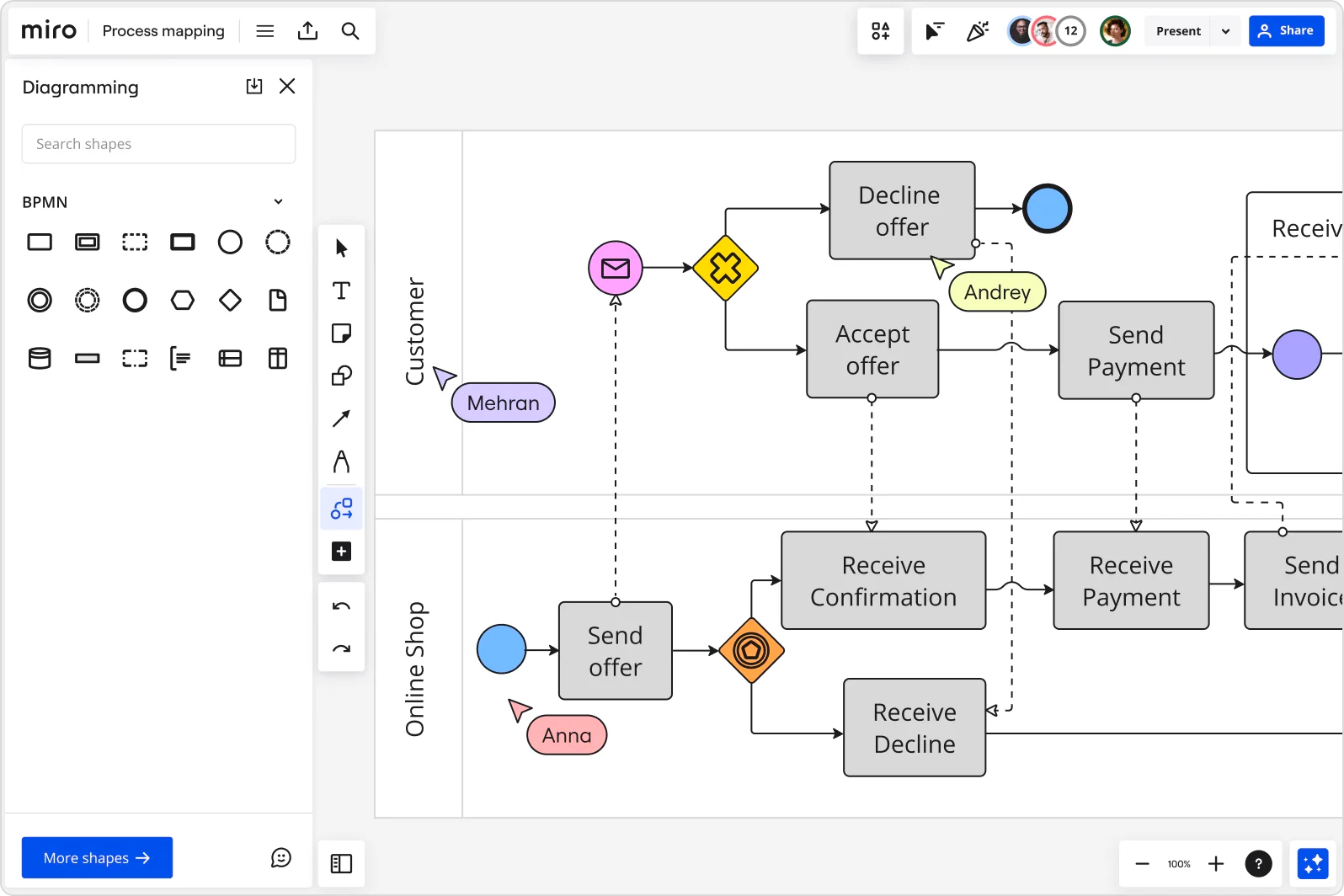
Miro
Niche product ideas for remote workers
- Virtual team-building activities or services
- Subscription boxes for home office supplies
- Online webinars for remote work skills
- Wellness apps focused on stress management and mental health
Remote work niche marketing ideas
- Interview thought leaders on the best ways to achieve work-life balance
- Host virtual workshops on productivity hacks for remote work
- Partner with remote-forward brands and companies to promote your products
9. Locals
With half of consumers preferring small local businesses over big retailers, even global brands are adopting local marketing strategies through targeted campaigns.
For online sellers, establishing a local presence can be challenging. But there are ways for ecommerce entrepreneurs to successfully serve niches local to their city or country.
Take the apparel company Peace Collective as an example. Founded in Toronto, it initially catered to the demand for Toronto Blue Jays merchandise during a playoff run. The brand has since expanded to serve other cities, primarily through sports team merchandise, by securing partnerships with franchises including the NFL, NBA, and MLB.

Peace Collective
Niche product ideas for locals
- Locally sourced food and beverages, such as a coffee blend from local roasters
- DIY kits for local crafts or traditional art forms
- Local guide books or maps highlighting hidden gems in the city
- Gardening kits with native plants or seeds
Marketing ideas for local niches
- Organize local pop-up events or workshops showcasing your products
- Collaborate with local artisans or chefs for limited-edition product lines
- Launch a “Love Local” campaign featuring stories of local customers using your products
How to find niche markets
Launching your store in a crowded marketplace can lead to a challenging uphill battle against established competition. So finding a niche market provides your online business with a competitive advantage, right from the start.
By focusing on a niche, you can compete—not necessarily by selling different products—but by concentrating on a specific segment of the market.
While there’s no one-size-fits-all method to discover niche markets and product opportunities, several popular strategies exist. Here are a few initial steps to understand a larger market and, from there, identify an underserved niche.
1. Start with Google searches
The best way to start brainstorming niche ideas is by understanding what other online retailers are selling in a product category or to a certain audience.
Beginning your niche selection with basic Google searches is a great way to get the lay of the land. Let’s use “cruelty-free makeup” as a starting point. From there, we’re able to find a goldmine of potential angles and rabbit holes, such as “vegan skin care” and “not tested on animals.”

Through trial and error, you can explore different trends until you find an underserved audience or demand in a niche market. Keep in mind that, even if a competitor is targeting your niche, you can still compete by niching-down on a specific segment of that audience. It’s all about being a specialist, not a generalist.
2. Confirm longer-term interest with Google Trends
If casual Googling throws up interesting results, the next step is to take your search queries to Google Trends.
By entering your search queries into Google Trends, you can view search interest over time and identify whether a niche has steady interest, is growing, or is just a passing trend. This can help you avoid investing in a niche that might not have long-term potential.
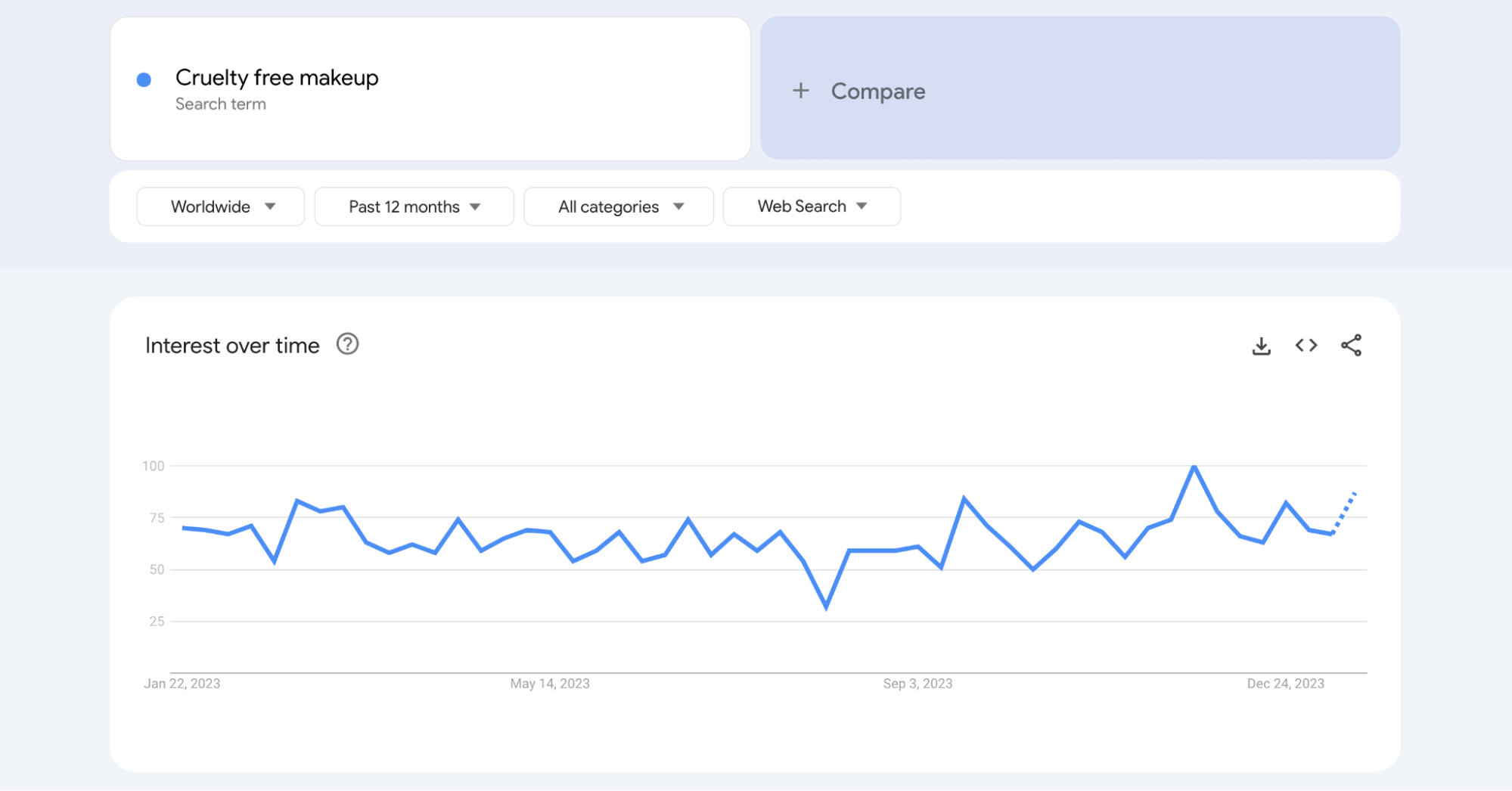
3. Build out a business idea by mind mapping
A mind map is a great way to think about how you could organize a business around different parts of a niche. Since mind maps mimic how our brains think, they’re an intuitive way to organize your thoughts and expand on ideas.
Building a mind map can help generate product ideas quickly while also encouraging you to explore different niche paths. You can use a free online tool like Text2MindMap to create a simple but effective visual aid.
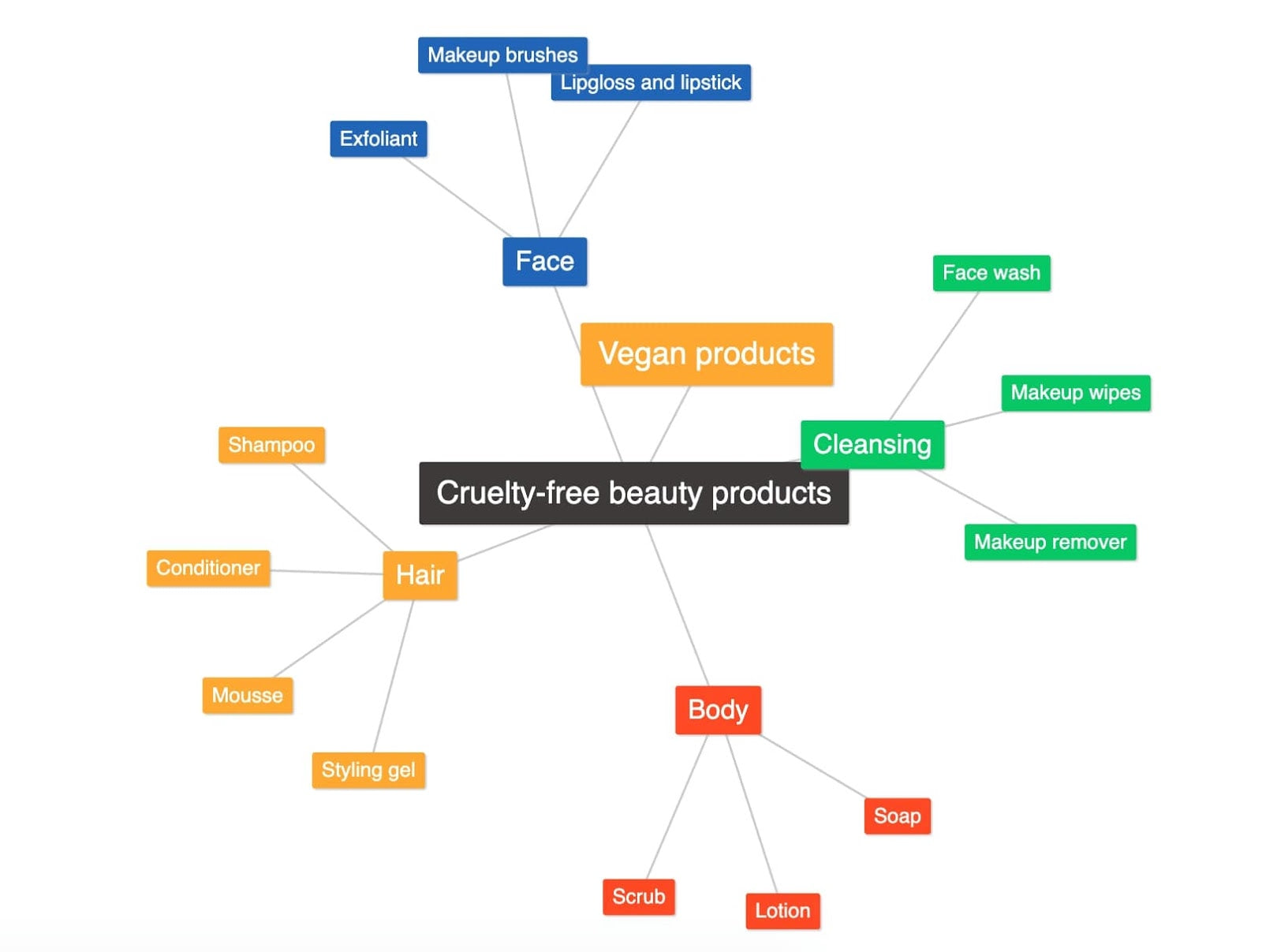
4. Discover sub-niches through Google’s search suggestions
Ever notice how when you start typing something into a Google search, automated suggestions appear?
These are Google’s most-searched-for related queries, which you can use to your advantage to find a niche for your product category.
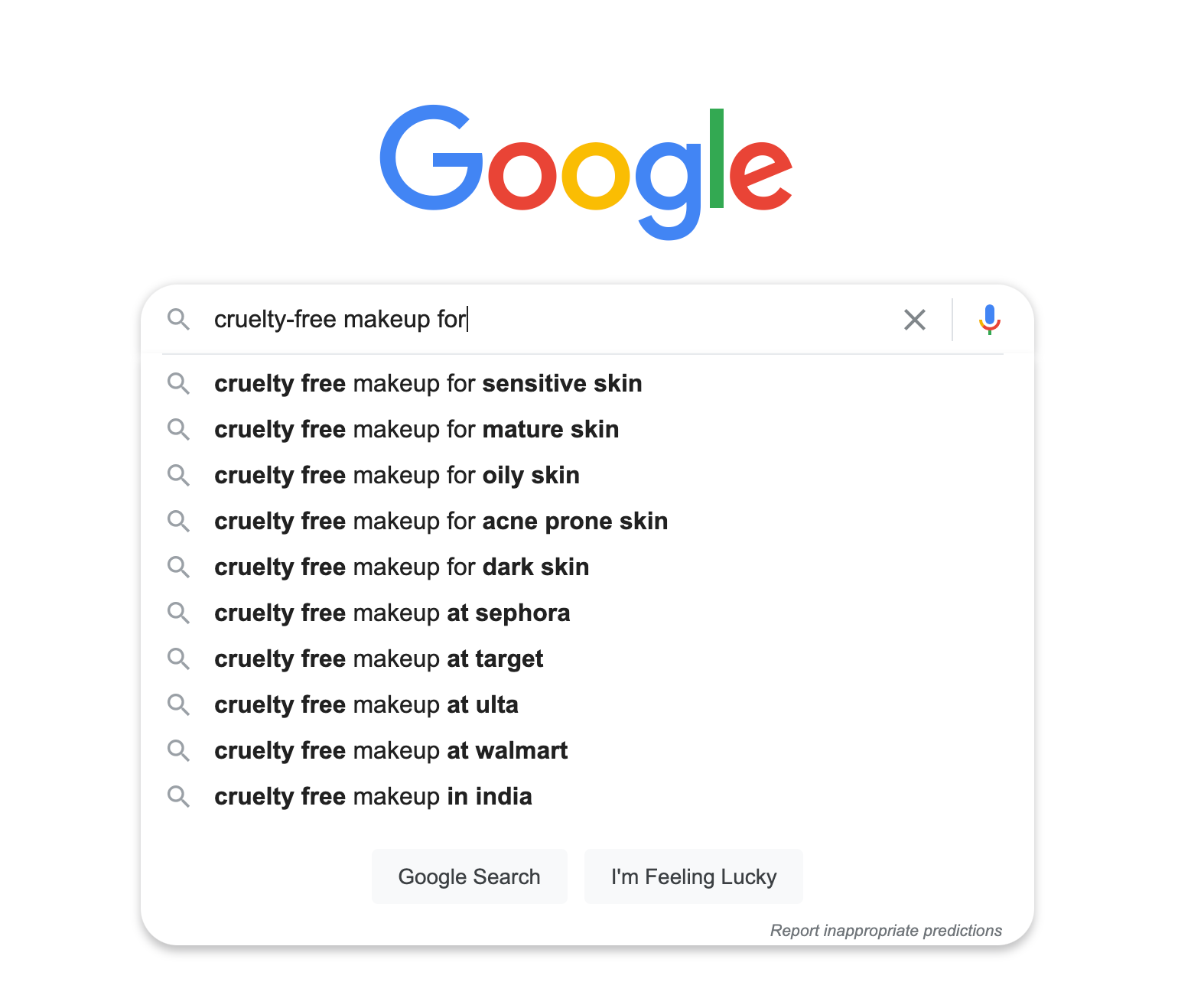
Google will only show you a few suggestions, so you may want to use a keyword research tool to gather more suggested searches.
This practice is known as long-tail keyword discovery. Long-tail keywords are often composed of a larger market (i.e., “cruelty-free makeup”) followed by the word “for,” then a smaller, niche market (i.e., “sensitive skin.”) They help describe the relationship between a niche and a wider product category.
Entrepreneurs use long-tail keyword data to assess customer interest and analyze competition in niche product areas.
5. Drill down with keyword research
A similar method for uncovering a niche uses Google’s Keyword Planner tool. Keyword Planner is a resource from Google’s advertising platform, Google Ads. The Google Keyword Planner is similar to the Google suggestion tool above, but offers advanced, customizable search data.
To use this tool, you’ll need a Google Ads account. Log in to your account and select Tools from the top menu, followed by Keyword Planner.
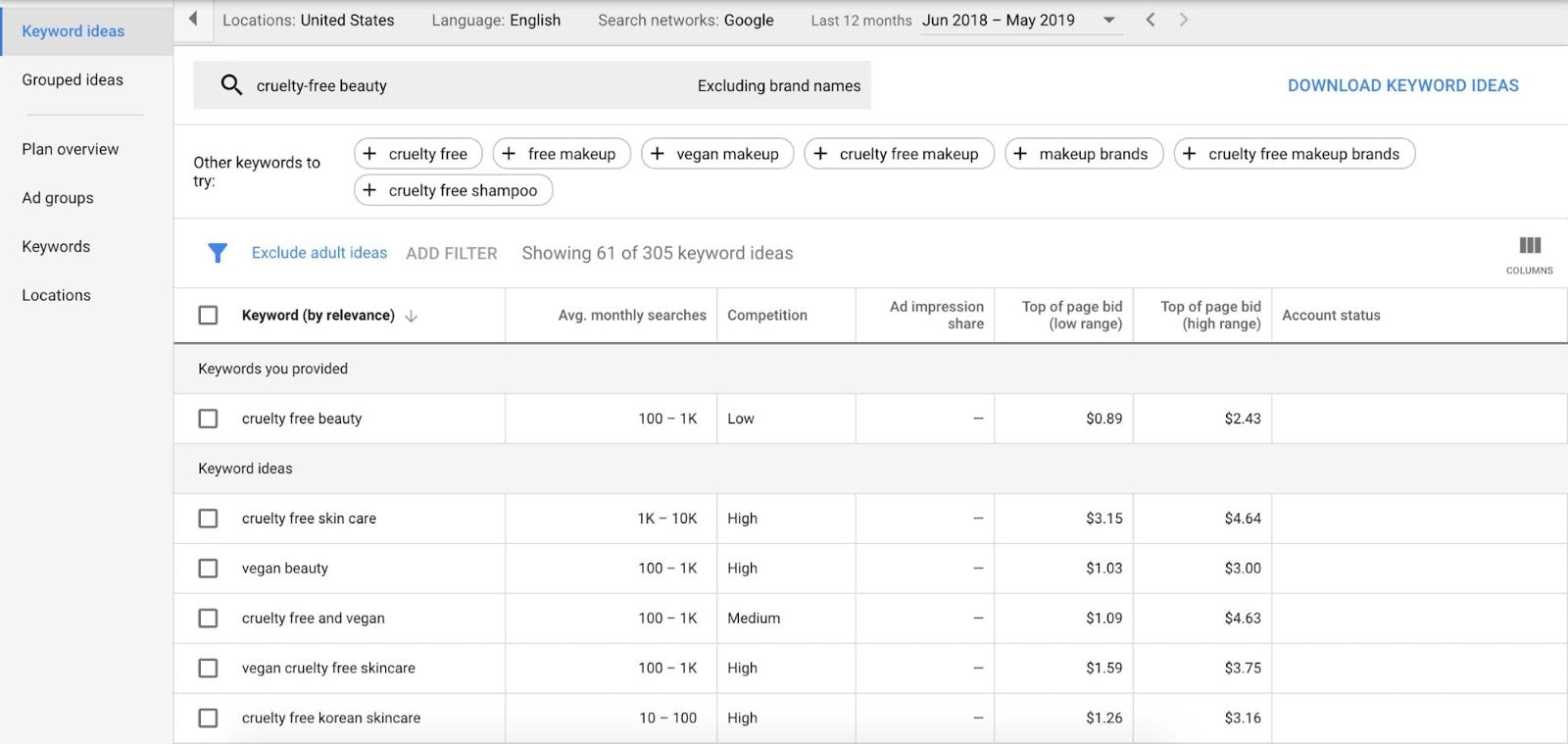
Enter your main niche idea to see your initial results. You can adjust your location settings on the left to make sure you’re targeting areas that you want to reach. You can also add filters, remove branded keywords, and check suggestions for other recommended terms.
Searching through keyword results can give you a good idea of potential niches related to your original search term—and sometimes even the demand for specific popular products. Don’t be afraid to dive deeper and try a variety of related search terms.
If you don’t have a Google Ads account, you can use the Keywords Everywhere browser extension to see search volume directly under your Google searches.
Read more: How to Find a Lucrative Dropshipping Niche for Your Business
Free Webinar:
How to Find and Source a Winning Product to Sell
In less than 40 minutes, let us walk you through how to find product ideas, how to validate them, and how to sell the product once you have an idea you want to pursue.
How to evaluate your niche market ideas
Discovering an appealing niche is just the beginning. The next question is whether your niche has room for a new business. Evaluating the size of the audience, consumer demand, and potential profitability of a niche is just as important as the initial idea.
Here are some ways to evaluate a new niche market idea:
Be wary of zero competition
Niches with few existing competitors might seem like golden opportunities. However, it’s important to consider why other entrepreneurs might have avoided that specific market. Perhaps consumer demand for the niche idea isn’t high enough, or products frequently have supply chain issues, leading to customer service challenges.
Test the waters before diving in
You could start with a small selection of dropshipping products and run a marketing campaign targeting your intended audience. Gather feedback from early customers, or send a few products to influencers for their opinion.
Early feedback, especially for a new product, is crucial for refining it before a full-scale launch.
Dig deeper into a niche
You already did the keyword research to identify your niche market, but you can go even more in depth. Analyze blogs, social media, Amazon reviews, podcasts, influencers, and other key areas in your niche to gain insights. Can you solve a problem that repeatedly comes up?
Keyword research helps identify a niche market, but deeper analysis can reveal more actionable insights. Take a look at these and other online resources to understand more about your chosen subject:
- Review websites
- Enthusiast blogs
- Social media posts
- Amazon reviews
- Industry podcasts
- Industry influencers
Is there a recurring problem within a niche that your product can solve? What features and metrics do consumers judge products by?
Stay on top of consumer trends in your market
Keeping abreast of developments in a chosen niche is crucial—your business must talk and act like an expert who’s in the know.
Resources like Meta Foresight, Think with Google, and Nielsen consumer research can help you understand consumer pain points, desires, and emerging trends.
Setting up Google Alerts for related keywords and monitoring social media conversations will ensure you’re informed about trending topics.
Explore growth opportunities
Early success is great, but due to their specificity, niches can evolve. When this happens, your business will need to adapt to emerging consumer interests. New product lines can be introduced as opportunities arise.
If your niche becomes saturated, or your business successfully fills it, consider pivoting to an adjacent audience. This flexibility can help maintain your business’s relevance and profitability over time.
When it’s time to market your product, always return to your niche audience’s needs and commonalities. What makes your audience different from the broader market? How can you appeal specifically to their preferences?
If your business can speak in your niche’s language, it will have a greater chance of gaining buyer trust and winning their confidence.
Read: How to Conduct a Market Evaluation
Moving forward with a niche marketing strategy
With a niche identified and relevant products sourced, it’s time to turn your business idea into a reality.
Whether your business plan involves crafting products independently, partnering with a manufacturer, or dropshipping, there are resources available to guide each step of the process:
Illustration by Rose Wong
Niche market FAQ
What does “niche market” mean?
A niche market is a segment of a wider market defined by its own specific needs, preferences, or identity, which differentiate it from the broader market.
What are examples of niche markets?
- Conscious consumers
- Health and wellness
- Pet owners
- Outdoor enthusiasts
- Travelers
- Gamers
- Homeowners
- Remote workers
- Locals
What is the difference between a mass market and a niche market?
A mass market aims to reach as many people as possible, while a niche market focuses on serving a specific group of people with defined needs or interests. For instance, a national grocery store chain caters to a mass market, while a local butcher shop that specializes in organic, locally sourced produce serves a niche market.
How do I choose a niche?
You can choose a niche by first identifying a broader market that interests you, then drilling down into specific areas within that market until you find a niche that resonates with you or your business goals. To generate ideas for a niche, examine search trends, create a mind map, or browse social media. This post provides guidance on defining and validating your niche.
What is niche marketing?
Niche marketing allows businesses to focus on a specific, often valuable type of customer with unique needs. Niche marketing strategies can include personalized communications and in-depth content that shares expertise about a product, industry, or hobby. The result of successful niche marketing is increased customer loyalty and a competitive edge over similar brands. Niche marketing enables businesses to establish themselves as leaders in their field, enhancing perceived credibility and trustworthiness.
How can I find a profitable niche market?
Identifying a profitable niche market involves researching market trends, understanding customer needs, and assessing your competition. Tools like Google Trends, keyword research tools, and social media can provide valuable insights. Once a potential niche is identified, validate its profitability by assessing demand, competition, and, importantly, the potential for growth.





